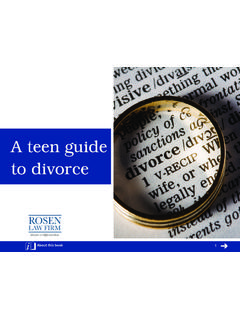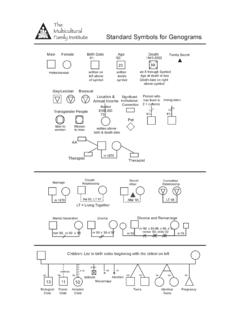Transcription of After the Affair - Dr. Edward Dreyfus
1 1 . PSYCHOTHERAPY UPDATE Volume 20, No. 3 Edward A. Dreyfus , Clinical Psychologist Psychotherapy Relationship Counseling Sex Therapy Life Coaching helping people maximize their potential & achieve their goals 1421 SANTA MONICA BOULEVARD SANTA MONICA, CALIFORNIA 90404 (310) 208-5700 After THE Affair 1 Among the worst experiences a lover or spouse can endure is discovering that their partner either is hav-ing or has had an Affair . The sense of betrayal is so powerful that one does not think it is possible to ever get over Someone who feels betrayed may experience a wide array of emotions ranging from deep sadness to severe depression to murderous rage, and everything in between.
2 There is no correct set of feelings appropriate to this universal experience. The effects of an Affair on a relationship can simi-larly range from total destruction to a desire to learn from the Affair and work toward strengthening the relationship. In the words of Dr. Janis Abrahms Spring, an Affair can either be a death knell or a wake-up call. 1 Based, in part, on the book of the same title, After the Affair , by Janis Abrahm Spring, , published by Harper Perennial in 1996 Frequently, patients may say to me that they are considering hav-ing an Affair . They may either have someone in mind, or they may be simply musing about the possibility.
3 Invariably, how-ever, there is some underlying issue that is driving these thoughts. Why else would they be willing to violate their com-mitment vows for a one-night stand? A one-night stand leaves the relationship altered in some way even if one is not caught. It leaves the unfaithful partner living a lie that will affect the rela-tionship. I suggest that instead of acting on the fantasy, they discuss their discontent with their spouse, putting the issues on the table, and begin the process of working toward resolution before it is too late. The fantasy, itself, can be a wake-up call, letting the partners know that all is not well on the home front.
4 Hen an Affair has already been consummated, how-ever, it is difficult to get through the pain and anguish of the betrayal to look at the nature of the relationship that may have set the stage for the Affair . All too of-ten, this examination is experienced by the betrayed party as put-ting the responsibility on him or her rather than on the unfaithful partner. Nonetheless, if a couple has decided that they want to remain together despite the Affair , this examination becomes part of the healing process. To be sure, it is much easier to turn one s back on a relationship that has been damaged by an Affair than to move toward getting beyond the pain to examine the relationship.
5 It takes consider-able courage and determination to rebuild trust, examine one s own contribution to the state of the union, and to put in the re-quired effort to make the relationship work. Similarly, it takes great humility on the part of the unfaithful party to face his or her shortcomings, character failings, and fears to overcome the guilt for having inflicted such harm on one s partner, and move for-ward to earn forgiveness. STAGES OF HEALING According to Dr. Spring, there are three stages of healing: Stage 1: Normalizing one s feelings. The betrayed partner is often flooded with a host of feelings. Almost any feeling that one has is normal.
6 An Affair leaves one feeling violated, alone, distrusting, and filled with self-doubt. Often there is a profound sense of loss, as though the very ground upon which one walks has been pulled out from under, leaving one suspended in space. There are many losses that one may experience: loss of faith, sense of specialness, self-respect, sense of purpose, to name a few. One may doubt one s sense of reality; one s fundamental beliefs may get thrown in to question. In short, someone who has been betrayed may no longer can be sure of his or her own sense of identity. While one may feel as though he or she is go-ing crazy, they are not.
7 All of these feelings and more are com-pletely normal given the magnitude of the trauma experienced. The unfaithful partner may also be filled with a variety of feel-ings. However, no matter how awful he or she might feel, it does not compare to what the betrayed partner feels. It is not nearly as shattering for for the unfaithful partner as it is for the betrayed. Stage 2: Deciding whether to recommit or quit. Some people may believe that once a partner strays, the relationship is over. They may also believe that once there has been a betrayal, re-building the trust is impossible. Taking this position, however, precludes the possibility that people can change, that people can W 2 learn from their mistakes, and that something once broken can be repaired.
8 Whatever one s beliefs, most psychologists would en-courage people to avoid making decisions based on assumptions that are highly subjective, or based on a highly charged emo-tional state. What feels right while one s emotions are raw may not be what s right later. ssentially there are four options: (a) to leave the relation-ship and not look back; (b) to remain in the marriage and never discuss or explore what happened; (c) to stay in the relationship and permit the Affair to continue; and (d) to remain in the relationship working toward rebuilding trust, de-veloping a more intimate relationship, and developing a plan for assuring that it won t happen again.
9 If one chooses the first option of leaving the relationship, he or she runs the risk of not having learned anything from the Affair , thus risking repeating the same mistakes again in the future. One also runs the risk of leaving with a great deal of bitterness that may build-up as time goes on. If one chooses to simply put the Affair behind without discussing any of the factors that may have led to the Affair , one runs the risk of living a life of constantly wondering whether it will hap-pen again. All of one s questions are left unanswered; one learns nothing, and one leaves the ground fertile for it to happen again or for suspicion to build.
10 Neither party has the opportunity to learn from the experience. If one chooses to remain in the relationship and permit the Affair to continue, one is virtually assuring himself or herself a life of resentment, guilt, anger, depression, and loss of self-respect. Unless both parties have agreed to a sexually open marriage, and have the maturity to carry it off responsibly, in the majority of cases where it has been tried this option has not proven to be viable. The last option, that of remaining together and working toward rebuilding one s relationship, gives both parties the opportunity to learn from the experience.






